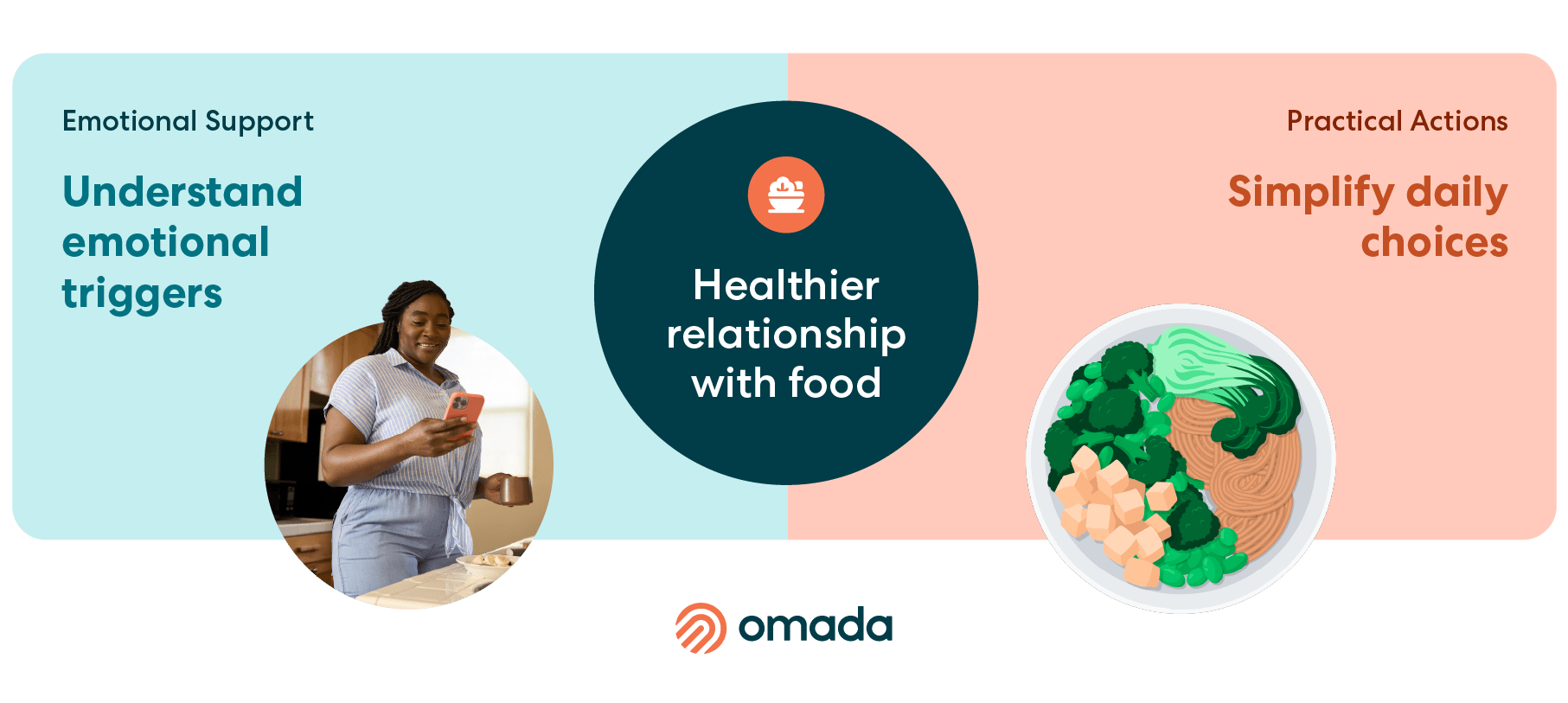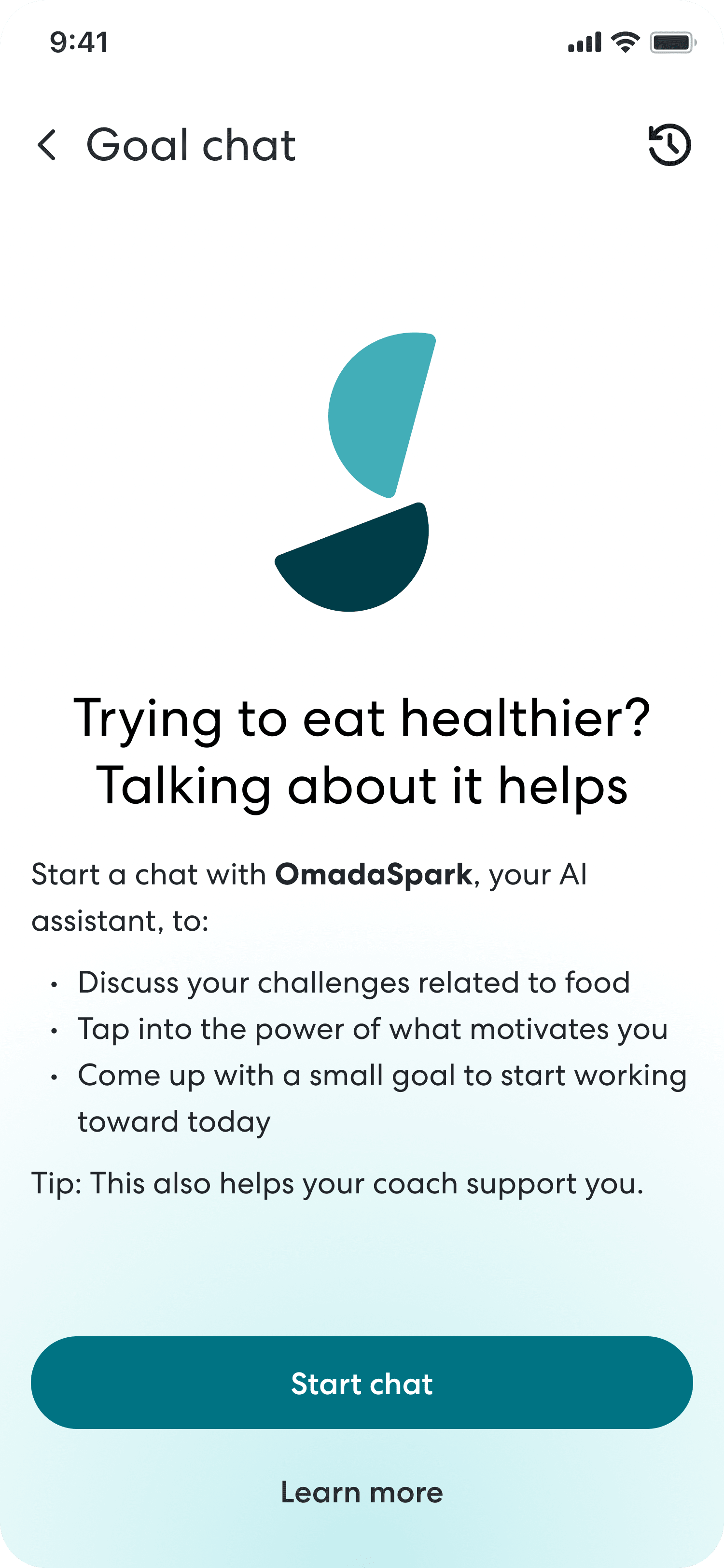Why Omada’s Product Team Developed a New In-App Food Experience

Almost a quarter of Americans have reported that they have too little time to cook healthy foods, while 20% said they simply don’t know how. In a national survey, more than one-in-ten of older US adults met established criteria for an addiction to highly processed food in the past year. Diet culture is widespread, despite limited evidence supporting long-term health outcomes of fad diets. In fact, some studies suggest the potential for negative health consequences from following these diets long-term. In the summer of 2024, Omada Health’s product team began considering new, anti-diet approaches to meet the moment and evolving member needs around everyday nutrition obstacles.
In late 2024, they conducted in-home interviews across the country with both members and non-members, and surveyed an additional 435 members. They found that members were receptive to Omada as a source of nutrition advice, but they also craved more. For example, they wanted more help understanding which foods fit into categories like healthy fats and non-starchy vegetables, so they could put common nutritional guidance into practice. Many people also sought practical tools to simplify decision making (i.e. planning, shopping and cooking), and more help identifying and responding to emotional eating triggers and habits. A clear opportunity emerged: tailored nutrition guidance with practical support that members can count on in real time.
Members want more support with:
By leveraging the power of AI, Omada recently unveiled Nutritional Intelligence, a new in-app food experience, complete with easy-to-use tools that address the most prevalent healthy eating barriers that members face. To learn more, we sat down with Dr. Sarah Linke, PhD, MPH, Senior Director of Clinical & Translational Research, and Ellery Cook, Senior Director of Product Management, who were both instrumental in the research and development of Nutritional Intelligence.
Why We Took on Omada’s New Food Experience
Omada Health: So, this is the big question: why focus on food?
Sarah Linke: Geat question. Well, for starters, of course at the heart of everything we do is our mission to bend the epidemiological curve. Despite near-universal awareness that obesity is hazardous to people’s health, population-wide obesity rates remain alarmingly high. In fact, 40% of the U.S. adult population is living with obesity.
Ellery Cook: And while GLP-1s are incredibly effective for weight loss, decades of research tell us that diet, physical activity, sleep, and social support are crucial too. Even members taking GLP-1s benefit tremendously from support in these areas, and they’ll need these habits and skills to maintain their weight post-discontinuation.
SL: Right, and among those areas, food is the biggest contributor to weight loss. Given that many of our members join Omada to lose weight, we have both a responsibility and a strategic opportunity to deliver a best-in-class food experience.
EC: And taking it a layer deeper, food doesn’t just affect weight—it impacts how we feel and how we function. It’s critical to our long-term health, and yet changing how we eat is notoriously difficult, with busy schedules, constant distractions, and the emotional baggage food carries for many of us.

Why Changing Diet Habits is so Hard
OH: Thank you both. On that last point, what exactly is so hard about changing how we eat?
SL: I don’t know about you, but for me–between back-to-back Zoom meetings, and keeping up with Slacks, emails, Google docs, and slide decks––finding the time for healthy eating can seem nearly impossible.
EC: I will be the first to admit that my snacking often has more to do with wanting a break than how hungry I am.
SL: The same goes for our members. Changing diet habits is about more than just finding healthy recipes or counting calories, but addressing real barriers like time, access, stress, and the constant cycle of temptation and guilt.
Behind Omada’s Anti-Diet Approach
OH: And how is Omada’s Food Experience helping members address those real barriers? We can start with the big picture and zoom in, if you’d like.
EC: Perfect. We’re talking about more than just nutrition guidelines, and we’re going beyond simply tracking meals. We’re developing cutting-edge tools designed to help members overcome their barriers and put learning into action to achieve their goals. We’re enhancing our care approach with engaging AI to provide real-time support precisely when it’s needed, and backing it up with the human touch that has always been at the core of what we do.

- Explore emotional triggers and motivations around food
- Set sustainable, focused personal goals
- Benefit from coaching informed by conversation summaries
SL: I love talking about this. And it’s exactly what sets us apart from many other chronic care solutions. Many of them focus more on restrictive dieting, with strategies like the keto diet, or relying on GLP-1s alone. They’re looking for faster turnaround times and immediate gratification. But not Omada. We’re doubling down on our core strategy of providing between-visit care rooted in behavior change science, now enhanced by Nutritional Intelligence and leading technology.
EC: Our anti-diet approach is designed to help our members achieve lasting progress in their weight health journey. And for our customers, we think this will translate to a more personalized, sustainable solution that keeps members engaged longer, improves outcomes, and provides greater value on investment over time. Our goal is to reduce friction and create an engaging experience that keeps members coming back.
Getting a Deeper Understanding of Omada Members
OH:Let’s step back for a second. How did you get inside the head of members to better understand what barriers they face when it comes to healthy eating?
EC: So, we've talked to hundreds of members over the years and some of them welcomed us into their home last fall. As we started work on Omada’s new food experience, we saw an opportunity to support members in two critical ways.
SL: First, we saw a chance to help change their relationships with food for the better by addressing the underlying emotions that influence how people eat. Second, we uncovered that there’s an exciting opportunity to offer practical, tailored support in real time that makes it easier for members to make healthier nutrition choices.